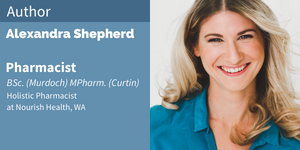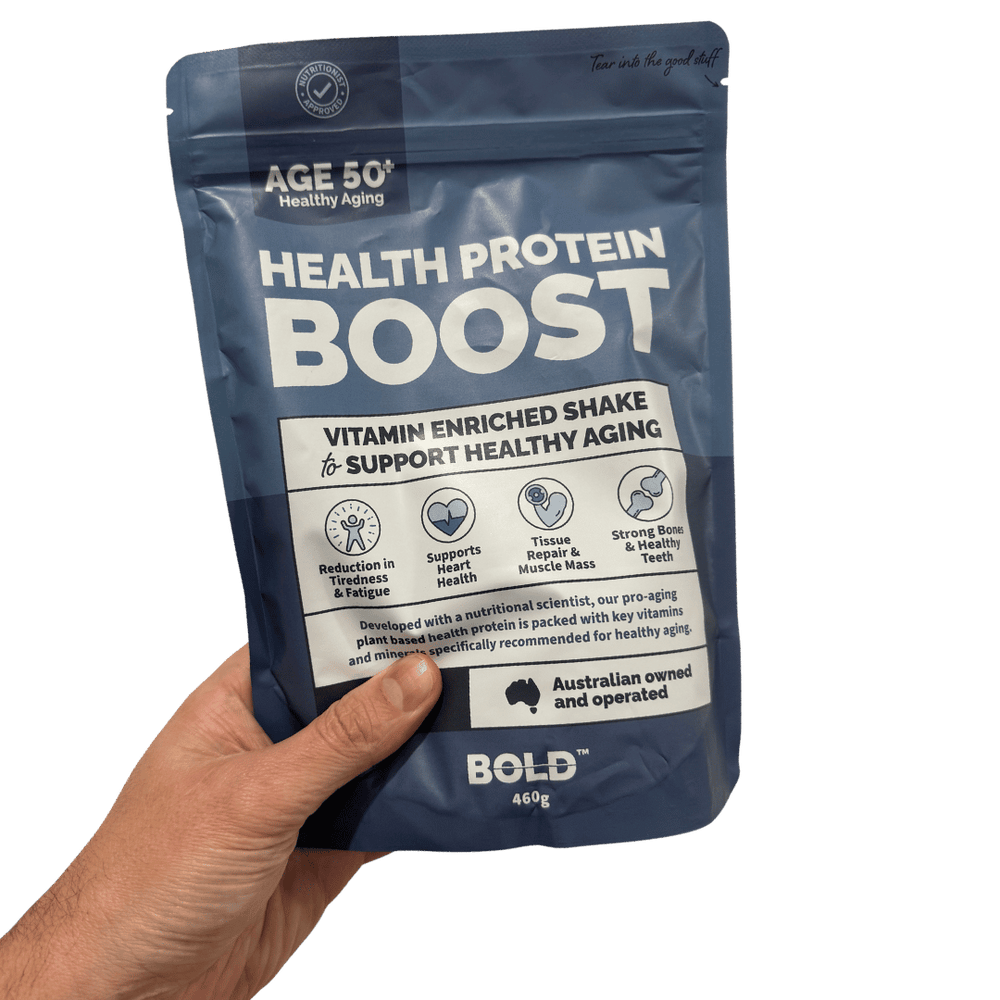The essential nutrients to age well
It's not how much you eat but what you eat that makes the difference as we age.
Topics covered
- Why the body’s requirements change
- Protein
- Fibre
- Calcium and Vitamin D
- Vitamin B12
- Magnesium
- Omega-3
It is universally acknowledged that your body will change as you age. Yes, things may start to feel different and your energy output may not be what it once was.... But you don’t need to resign yourself to the couch or live your life feeling flat and weak.
You can flourish and age well by keeping up with these 7 essential nutrients.
Firstly, why the body’s requirements change
As you get older, your body generally requires fewer calories. This is primarily because you are no longer putting out the same amount of energy as you once did in your 20s, but also because your overall muscle mass reduces with age. Your nutritional requirements, on the other hand, surprisingly increase.
So why do you need more nutrients with age? Two main reasons could contribute to this.
- As we get older the body becomes less efficient at absorbing and utilising nutrients.
- Secondly, the majority of people tend to be put on more medications which may further inhibit nutrients from being absorbed.
Research shows that the quality of one's diet can have a huge impact on a person’s physical strength, cognitive function, gut health, bone health, cardiovascular health, and immune system.
The nutrients that become especially important for us to age well include protein, fibre, calcium, vitamin D, and B12. In addition to these, you may find magnesium and omega-3 can further support your overall vitality and wellbeing.

Protein
Protein intake in older adults is required to help improve muscle mass and tone, prevent muscle deterioration, help maintain energy balance, weight management and even help with cardiovascular function.
On average, we lose up to 3-8% of our muscle mass every decade after the age of 30 and this becomes even more rapid after the age of 60. The impact of this can mean reduced physical ability, a potential increase in falls and fractures, and an increased risk of osteoporosis.
Unfortunately, as we get older, our ability to absorb protein seems to also be reduced. A study showed that older adults needed a dietary intake of protein that was up to 70% higher than that of younger adults.
For these reasons, older people need to ensure they are consuming enough protein each day to continue to age well. This may mean taking a protein supplement in addition to eating a healthy amount of protein each day as part of a healthy balanced diet..
Fibre
Another aspect of the body that is impacted by age is your stomach and bowel. As one’s body matures the bowel can become sluggish and the stomach may produce less acid. This means food isn’t broken down efficiently and can cause constipation, a common complaint in older folk.
The risk of bowel related diseases such as bowel cancer also increases with age. It is recommended that people screen for bowel cancer after the age of 45 as it is the 2nd deadliest cancer in Australia.
There is good evidence however that shows a diet high in fibre can reduce this risk. Studies also show that a high fibre diet can significantly improve constipation and inflammation within the bowel wall.
Calcium and Vitamin D
Calcium is a very important mineral in the body and an essential nutrient to help with healthy ageing. It is required to help your muscles move, for your heart to beat, and for bone strength.
Approximately 99% of your body’s calcium is stored in the bones giving them their strength and density. The remaining 1% is found in the blood and is very strictly regulated. If this level of calcium starts to drop, your body will draw from the calcium in the bones.
This is why if you don’t have a high enough calcium intake in your diet and if you don’t have a strong bone foundation, you may be at an increased risk of osteoporosis.
Once again, your body’s ability to absorb calcium is also reduced with age. Vitamin D is important here because it helps the body absorb more calcium.
Vitamin B12
Vitamin B12, also known as cobalamin, is another essential nutrient that can start to deplete with age. It’s been estimated that 10-30% of the population are unable to absorb B12 from their diet effectively after the age of 50.
It is thought that this could be due to reduced acid production in the stomach that may prevent its absorption from food, medications can also inhibit its absorption.
The main role of Vitamin B12 is to maintain healthy blood cells and for healthy brain and nerve function.
Magnesium
Magnesium is a mineral that is often depleted in many adults of all ages. It’s required for over 300 processes in the body. It can help with muscle aches, pains, tension, sleep, mood, energy, heart health, and blood sugar balance to name just a few.
Most people don’t get enough magnesium from their food and often require magnesium supplementation. This is possibly due to the over processed foods we tend to eat.
Magnesium can be found in foods such as hemp seeds, nuts, spinach and other dark vegetables, beans, and dark chocolate. It is one of the essential nutrients that can help us to age well by changing how our body feels overall.
Omega-3 DHA
DHA, Docosahexaenoic acid, is an Omega-3 fatty acid that is considered one of the ‘good’ fats. It is found in oily fish like salmon, nuts, and seeds such as walnuts and flaxseeds, as well as avocado and tofu.
It has many health benefits that may help with healthy ageing. These include improving brain health and cognitive function, heart health, and combating inflammation. Some studies have even shown DHA can help improve good cholesterol (HDL) and reduce bad cholesterol (LDL).
It is also frequently studied for its health benefits in Alzheimer’s with some studies showing it may reduce cognitive decline.
To Summarise
The overall takeaway message here is that as the body ages it tends to have a reduced ability to absorb certain nutrients. You may particularly benefit from increasing your intake of Protein, Fibre, Calcium and Vitamin D, Vitamin B12, Magnesium and Omega-3 DHA.
Aging is, unfortunately, a process that we cannot avoid but we can promote healthy ageing by changing how we feel and function throughout our daily lives. It is most certainly possible to age well and live an active and fulfilled lifestyle.

We've put all these nutrients and much more into Boost, you can try it for yourself! Click here to start your BOLD journey >

References
- https://www.ncbi.nlm.nih.gov/books/NBK51837/
- https://www.healthline.com/nutrition/nutritional-needs-and-aging#You-Need-More-Calcium-and-Vitamin-D
- https://www.ncbi.nlm.nih.gov/pmc/articles/PMC2804956/#:~:text=One%20of%20the%20most%20striking,60%20%5B4%2C5%5D.
- https://www.ncbi.nlm.nih.gov/pmc/articles/PMC4924200/
- https://www.ncbi.nlm.nih.gov/pmc/articles/PMC6431367/
- https://www.aihw.gov.au/reports/chronic-musculoskeletal-conditions/osteoporosis/contents/what-is-osteoporosis
- https://www.hsph.harvard.edu/nutritionsource/vitamin-b12/
- https://www.webmd.com/diet/health-benefits-dha#1
- https://nutritionaustralia.org/fact-sheets/nutrition-and-older-adults-2/
- https://www.betterhealth.vic.gov.au/health/healthyliving/food-and-your-life-stages#food-for-older-people
----------------------------------------------------------------------------------------------------------
Medical Disclaimer
The information provided in this blog post is for general information only, it is not intended as medical advice. For medical advice please consult with a qualified medical professional who is familiar with your individual medical needs.


